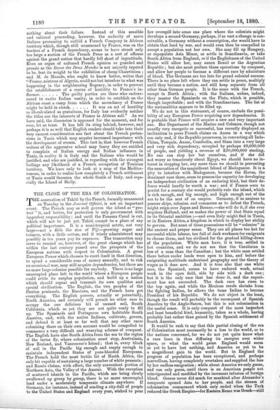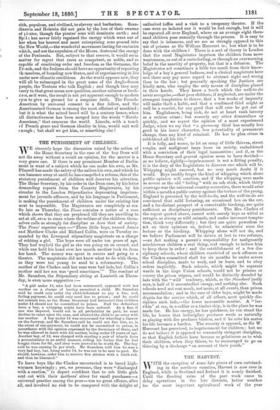THE CLOSE OF THE ERA OF COLONISATION.
THE annexation of Tahiti by the French, formally announced on Tuesday in the Journal Wel, is not an important .event. The French may as well govern the island as " pro- tect " it, and better, for protection is only government with imperfect responsibility ; and until the Panama Canal is cut, which will not be just yet, Tahiti cannot be a place of any political importance. It is a semi-tropical estate, not very large—not a fifth the size of Fiji—growing sugar and tobacco, with a little cotton, and if wisely administered may possibly in ten years pay its expenses. The transaction may serve to remind us, however, of the great change which has within the last century passed over the prospects of the European nations with respect to Colonisation. A great European Power which chooses to exert itself in that direction, to spend a considerable sum of money annually, and to risk an occasional war, may still acquire dependencies, but there are no snore large colonies possible for anybody. There is no large unoccupied place left in the world 'where a European people could settle its surplus population, and build up a nation which should repeat and transmit its own qualities and special civilisation. The English, the two peoples of the Iberian peninsula, the Russians, and the French have got everything. The English possess, actually or potentially, North America, and certainly will permit no other race to occupy the one delicious bit of unused soil, South California, which as yet they are not quite ready to fill up. The Spaniards and Portuguese own habitable South America, and, with the native Indians, cultivate, govern, and defend it at least so far well that any other races colonising there on their own account would be compelled to commence a very difficult and wearying scheme of conquest. The English have also South Africa from the sea to the region of the tsetse fly, where colonisation must stop, Australasia, New Zealand, and Vancouver's Island ; that is, every block of soil in the Pacific big enough and empty enough to maintain independent States of pure-blooded Europeans. The French hold the most fertile bit of North Africa, the only bit capable of sustaining a large number of white peasants ; and Russia claims, with effect, the only convenient portion of Northern Asia, the Valley of the Amour. With the exception of scattered islands in the Pacific, which are being slowly swallowed up group by group, there is no more unoccupied land under a moderately temperate climate anywhere. If Germany, for instance, instead of sending a city-full of people to the United States and England every year, wished to pour
her overspill into some one place where the colonists might develope a second-Germany, perhaps, if so vast a change is con- ceivable, a Germany without a conscription, she would have to obtain that land by war, and would even then be compelled to accept a population not her own. She may fill up Hungary, or repopulate Asia Minor, or settle in Scandinavia, or take South Africa from England, or if the Englishmen of the United States will allow her, may annex Brazil or the Argentine Republic ; but she must preface those operations by conquest, and allow her people to become a different race by admixture of blood. The Germans are too late for grand colonial success. There is no place left where they can settle in peace, multiply until they become a nation, and still keep separate from all other than German people. It is the same with the French, except in North Africa ; with the Italians, unless, indeed, they master the Spaniards on the Plate, which is possible, though improbable ; and with the Scandinavians. The list of the nationalities appears to be filled up.
We do not in this statement, of course, exclude the possi- bility of any European Power acquiring new dependencies. It is probable that France will acquire a new and very important one. Her Department of the Marine and Colonies, though not usually very energetic or successful, has recently displayed an inclination to press French claims on Anam in a way which can only end, if the Republic perseveres, in converting all Indo- China, Tonquin, Anam, Cambodia, and Siam into a very large and very rich dependency, occupied by perhaps 40,000,000 of people, and yielding a revenue of £20,000,000 sterling. No one can stop her but ourselves, and if she did not worry so tenaciously about Egypt, we should have no in- terest in stopping her, any more than we should in preventing the annexation of the magnificent Island of Madagascar. It is a pity to interfere with Madagascar, because the Hovas, the dominant race there, seem to possess the capacity for developing an independent civilisation of an enduring kind, but their de- fence would hardly be worth a war ; and if France were to persist for a century she would probably rule the island, which is rich enough, and big enough, and high enough out of the sea to be the seat of an empire. Germany, if as anxious to possess ships, colonies, and commerce as to defeat the French, might reign over Japan and Borneo,—she will do it, if she ever acquires Holland, and so makes the power of that State equal to its Oriental ambition ;—and even Italy might find in Tunis, or in Eastern Africa, a kingdom in which to display her ability to govern. But none of these possessions will be "colonies" in the ancient and proper sense. They are all places too hot for successful white labour, too full of dark workmen for emigrants to choose them, and too civilised for the gradual killing-down of the population. White men have, it is true, settled in hot countries, and we do not see that the Carolinian is less of a man than the Canadian ; but the white man settled there before cooler lands were open to him, and before the emigrating multitude understood geography and the theory of wages as it does now. And it is true also that one white race, the Spaniard, seems to have endured work, actual work in the open field, aide by side with a dark one ; but it is the only race that has done it, and the experi- ment has not succeeded. The dark race has risen to the top again, and while the Mexican creole shrinks from the fighting Indian he allows the tame Indian to become President of his Republic. We do not object in the least, though the result will probably be the reconquest of Spanish America by the Anglo-Saxon, bat this is not colonisation in the useful sense. It is only conquest of the most imperfect and least beneficial kind, humanity, taken as a whole, having probably lost rather than gained by the Spanish settlement of South America.
It would be rash to say that this partial closing of the era of Colonisation must necessarily be a loss to the world, or to the nations concerned, for we do not yet quite know what a race loses in thus diffusing its energies over wider space, or what the world gains. England would seem as yet to have lost nothing, and America as yet to be a magnificent gain to the world. But in England the progress of population has been exceptional, and perhaps marvellous, having completely overtaken and supplied the loss by her endless emigration ; while about America we only guess, and can only guess, until there is an American people not reinvigorated and modified by the incessant infusion of foreign blood. Greece never did much for mankind after Alexander's conquests opened Asia to her people, and the stream of colonisation commenced which only ended when the Turk reduced the Greek Empire—for Eastern Rome was Greek—still rich, populous, and civilised, to slavery and barbarism. Scan- dinavia and Holstein did not gain by the loss of their swarms of rirates, though the pirates' sons will dominate earth ; and Spri i has never fairly regained the energy which went out of her when her bravest and most enterprising sons poured into the New Wcrld,—the wonderful movement lasting for centuries which, and not the expulsion of the Moors, destroyed the energy of the Peninsula. But, subject to that reserve, it would seem matter for regret that races so competent, so noble, and so capable of combining order and freedom as the Germans, the Frnich, and the Italians should have no opportunity of repeating th3mselves, of founding new States, and of experimenting in life under new climatic conditions. As the world appears now, they will all be submerged in the great mass of the Anglo-Saxon people, the Teutons who talk English ; and though they may carry to that great ocean new qualities, another saltness or fresh- re3s, as it were, the result is not yet apparent enough to modern eyes to give us ground for a sanguine faith. The French- American by universal consent is a fine fellow, and the Americanised German is among the most efficient of mankind ; but it is what the mixed breed will be a century hence, when all distinctiveness has been merged into the words "North- American," that concerns the world. Lincoln, with a touch cf French grace and German ideality in him, would suit well ( nough ; but shall we get him, or something else ?



































 Previous page
Previous page